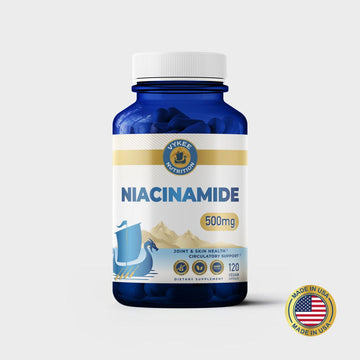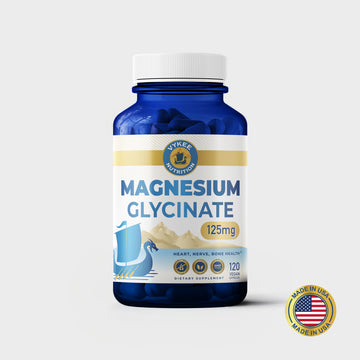Magnesium may not grab headlines like protein or creatine, but this essential mineral plays a critical role in muscle health, performance, and recovery. From preventing cramps to supporting energy production, magnesium's impact on muscular function makes it a nutrient deserving of attention in any wellness routine. This article explores the multifaceted relationship between magnesium and muscle health.
Why Magnesium Matters for Your Muscles
Magnesium is involved in over 300 biochemical reactions in the body, many of which directly impact muscle function. As the fourth most abundant mineral in the human body, magnesium's presence (or absence) can significantly affect how your muscles perform and recover.
The Science Behind Magnesium and Muscle Function
At a cellular level, magnesium influences muscle health through several key mechanisms:
Neuromuscular Communication
Magnesium regulates the communication between nerves and muscles by:
-
Modulating calcium channels that trigger muscle contractions
-
Helping maintain proper electrical potential across cell membranes
-
Supporting the release and uptake of neurotransmitters at the neuromuscular junction
These functions help ensure smooth, coordinated muscle contractions and prevent unwanted muscle activity like spasms or cramps.
Energy Production and Utilization
Muscles require energy to contract and perform work. Magnesium supports this energy production by:
-
Acting as a cofactor for enzymes that produce ATP (adenosine triphosphate), the body's primary energy currency
-
Helping convert glycogen to glucose for energy during exercise
-
Supporting mitochondrial function, the cellular "power plants" in muscle cells
Our high-quality magnesium supplements support optimal energy production for better performance. Explore our full range of Vitamins & Minerals to find the best magnesium-based products.
Protein Synthesis
Building and repairing muscle tissue depends on protein synthesis, a process supported by magnesium:
-
Magnesium is required for the function of ribosomes, the cellular structures that build proteins
-
It helps activate enzymes necessary for amino acid incorporation into new muscle tissue
-
Supports mRNA transcription, a critical step in protein synthesis
Magnesium's Impact on Exercise Performance
Whether you're an elite athlete or someone who enjoys occasional physical activity, magnesium status can influence your performance in several ways:
Endurance and Stamina
Research suggests that magnesium may support endurance by:
-
Improving glucose availability during prolonged exercise
-
Enhancing oxygen delivery to working muscles
-
Reducing the perception of effort during physical activity
For those engaged in endurance activities, maintaining optimal magnesium levels could help delay fatigue and improve performance. Explore our Vitamins & Minerals collection for performance-boosting supplements.
Strength and Power
For strength-focused individuals, magnesium contributes to:
-
Optimal muscle contraction force
-
Improved power output
-
Better coordination during complex movements
Check out our collection of anti-inflammatories to enhance recovery and strength after workouts.
Magnesium and Muscle Recovery
Perhaps one of magnesium's most valuable roles is in supporting post-exercise recovery:
Reducing Muscle Soreness
Delayed onset muscle soreness (DOMS) is a common experience after intense or novel exercise. Magnesium may help mitigate this discomfort by:
-
Supporting the body's natural anti-inflammatory processes
-
Promoting muscle relaxation after intense contractions
-
Facilitating removal of metabolic byproducts from working muscles
Preventing Muscle Cramps
Muscle cramps can range from annoying to debilitating. Magnesium helps prevent cramping through:
-
Balancing calcium influx that triggers muscle contractions
-
Supporting proper electrolyte balance
-
Maintaining healthy nerve function that controls muscle activity
Our specialized recovery formulations provide targeted support for post-exercise needs. Check out our Vitamins & Minerals collection for the best magnesium-based solutions.
Supporting Quality Sleep
Recovery occurs primarily during sleep, and magnesium plays a crucial role in sleep quality:
-
Helps regulate neurotransmitters that promote relaxation and sleep
-
Supports healthy levels of the sleep hormone melatonin
-
Relaxes muscles to reduce nighttime tension or spasms
Signs of Suboptimal Magnesium Status
Despite its importance, magnesium deficiency is surprisingly common, affecting an estimated 50-60% of adults. Potential indicators of insufficient magnesium include:
-
Frequent muscle cramps or spasms
-
Prolonged recovery time after exercise
-
Unexplained muscle weakness or fatigue
-
Poor sleep quality
-
Exercise-induced muscle twitching
These symptoms can impact both athletic performance and everyday quality of life.
Optimizing Magnesium Intake for Muscle Health
Ensuring adequate magnesium levels involves both dietary choices and potentially supplementation:
Food Sources of Magnesium
Nutrient-dense foods high in magnesium include:
-
Dark leafy greens (spinach, kale)
-
Nuts and seeds (especially pumpkin seeds and almonds)
-
Legumes and beans
-
Whole grains
-
Dark chocolate
-
Avocados
Supplementation Strategies
When diet alone isn't enough, supplementation can help. Consider these factors:
-
Form matters: Magnesium glycinate, citrate, and malate tend to be better absorbed than oxide forms
-
Timing: Taking magnesium in the evening can support relaxation and sleep quality
-
Pairing: Vitamin D and B6 enhance magnesium utilization in the body
-
Dosage: Most adults benefit from 300-400mg daily, with active individuals potentially needing more
Explore Vykee's magnesium supplements to find the right formulation for your needs. Visit our Vitamins & Minerals page to browse our options.
Special Considerations for Athletes and Active Individuals
Those who engage in regular, intense physical activity have unique magnesium needs:
-
Increased losses: Sweating during exercise increases magnesium excretion
-
Higher turnover: Tissue breakdown and repair require additional magnesium
-
Stress response: Physical training creates physiological stress that increases magnesium utilization
-
Electrolyte balance: Intensive training affects overall electrolyte status, including magnesium
The Vykee Nutrition Approach to Magnesium Supplementation
At Vykee Nutrition, we understand the critical importance of magnesium for muscle health and overall wellness. Our magnesium supplements are:
-
Available in highly bioavailable forms for optimal absorption
-
Formulated to minimize digestive discomfort
-
Manufactured in FDA-registered facilities
-
Third-party tested for purity and potency
Whether you're an athlete looking to optimize performance or someone seeking better recovery and muscle comfort, our comprehensive magnesium collection has options tailored to your needs. Check out our Vitamins & Minerals page for more details.
Remember that magnesium works best as part of a comprehensive approach to muscle health that includes proper nutrition, adequate hydration, appropriate training, and sufficient recovery time. Consult with a healthcare provider before beginning any supplementation regimen, especially if you have existing health conditions or take medications.
Support your muscles from the inside out with optimal magnesium nutrition—your body will thank you with better performance, faster recovery, and improved comfort during your daily activities.


